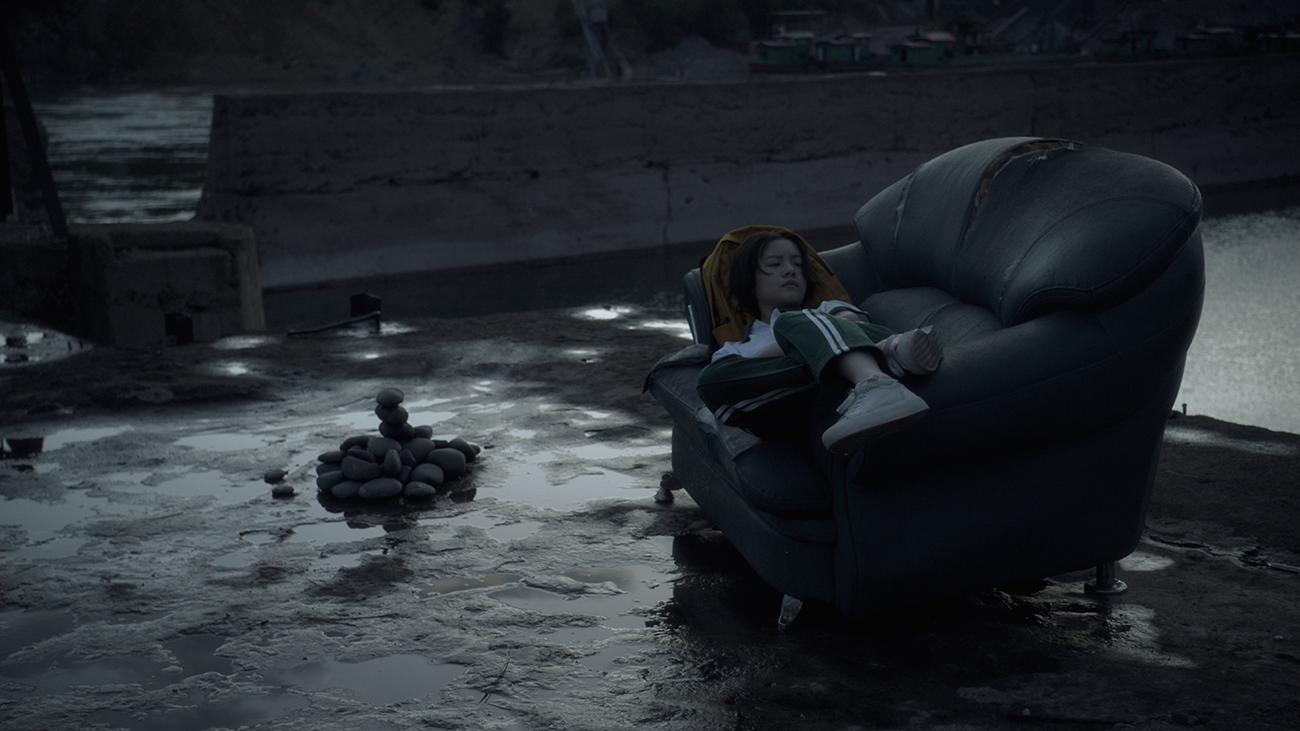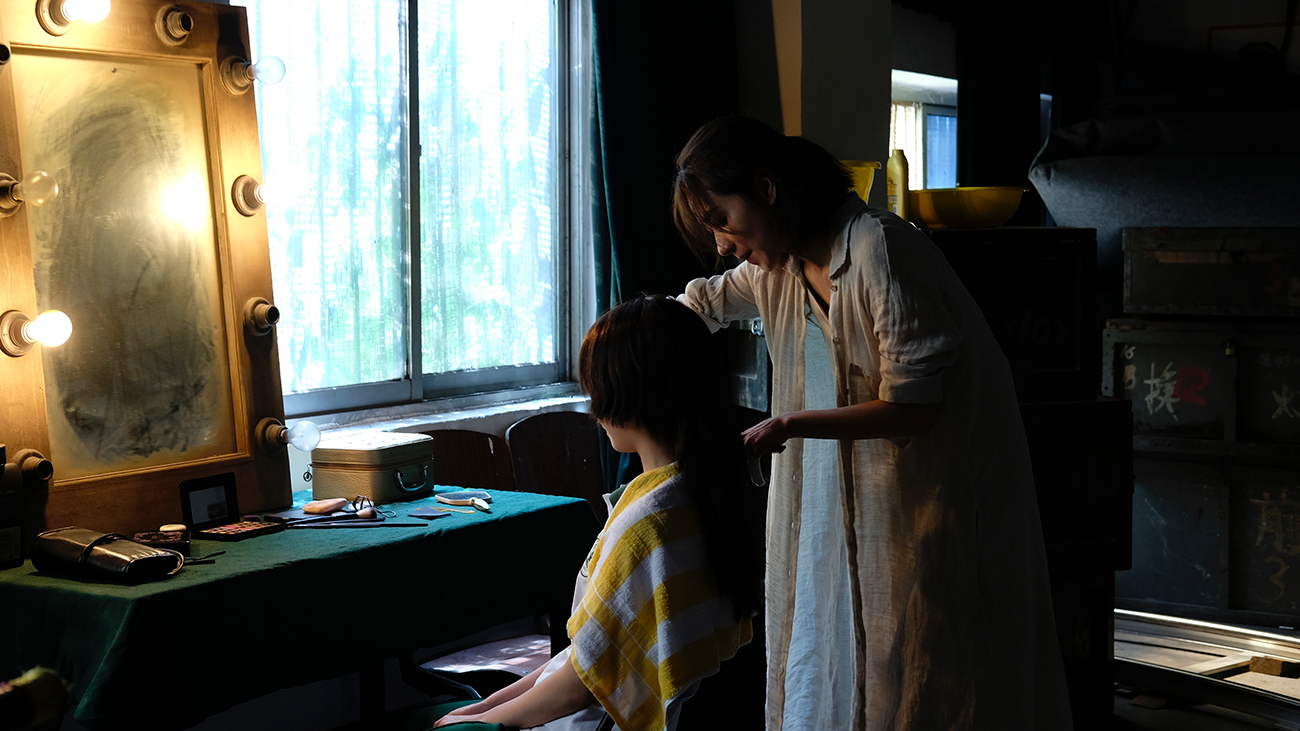Old Town Girls takes place in a dilapidated industrial town in Sichuan. Shui Qing (Li Gengxi) is a gloomy teenager who wanders between a monotonous school and a home where her stepmother displays obvious segregation between her and blood-born kin. When her biological mother Qu Ting (Wan Qian) sashays back into town after years away, it makes perfect sense that she’s infatuated.
The film can be described as a fascinating dream within a dream. The town where the story takes place can best be described as part of a rust belt, indicating an economical dream that has run its course, depleted just like the resources of the land. But at some point long ago, the people living there might have envisioned a heyday that rewarded them with abundance. Similarly, Qu Ting shares with Shui Qing grandiose stories of her dreams as a performer as she settles into a gilded lounge chair that occupies the centre stage of a deserted theatre. Shui Qing is enraptured, for here is the mother she has dreamed of, who professes an ambition that surpasses the suffocating limits of the town. Even Shui Qing’s schoolmates are whirled away by Qu Ting’s fairytale. But Qu Ting is far from a parental role model – she borrows money from the wrong people and ends up in a dire situation, dragging her daughter right into the thick of it.

First-time director Shen Yu captures the youthful hopes and illusions of these young women with a careful eye, but similarly subjects viewers to a constant portentous air by contrasting flaking concrete and torn upholstery with clean white school uniforms and blouses that billow in the wind. As they – Shui Qing, her mother, and her schoolmates – stick their hands out of a car riding down an empty traffic tunnel, warm yellow lights set sparkling eyes ablaze. Aesthetically, Shen’s inspiration from other neo-noir mood pieces is evident. And characteristic of the genre is often inevitable tragedy.
If we can assume that the town deteriorated due to economical violence, these women living in it bear this analogy as a heavy cross. It’s not just the case for the mother-daughter pair who become victims to thug-like loan sharks; Shui Qing’s two friends both have terrible relationships with their own families, one clearly neglected by parents who work out of town and the other physically abused by a father who isn’t well-to-do.
Even the timorous white rabbit with its downturned ears, when cornered, can one day bite you on the hand. What many people may forget is this: rabbits have razor-sharp incisors too. This poignant image comes to mind when we look at the Chinese language title of the film, which could be translated literally as ‘rabbit violence’. Shui Qing, up to now a meek individual despite circumstances, is pushed to her wit’s end because of her mother’s heavy debts. She ends up formulating a scheme where they pretend to kidnap her friend and attempt to resolve their woes by asking for a ransom. Unfortunately, their plans go horribly awry and push them further into despair.
More than showing us a cycle of violence that perpetuates, Shen’s film additionally proposes violence as a headless creature that’s indiscriminate, with the ability to make monsters of us all and to tear down anyone in its trajectory.

If you’re familiar with Chinese entertainment, you may have seen the leads Wan Qian and Li Gengxi in other more spirited dramas (or perhaps you remember the former from Diao Yinan’s The Wild Goose Lake). They’re both impressive actors who make you curious to see what’s next in their careers; they hold their weight against each other, building a believable and heartrending relationship between their characters that sustains the tension of the film. Without them, the second half of the film may not have escaped from its fuzzy downturn, somehow losing focus on the complex relationships built in the first forty minutes or so to instead go down the rabbit hole of unintentional misdeeds.
While conceptual reasoning behind plot developments may do just enough to hold the seams of the narrative together, it does make you wonder more about all the unexplored avenues over the action that’s delivered to us. Shui Qing’s friends, for example, are similarly rich characters who, by the end, fade right into the background. In a way, it’s this loss of character trajectory that makes the final act of violence and the lead-up to it lose its impact.
That said, Old Town Girls is still a film worth watching. It shows the potential of a new director and furthers the canon of Chinese-made neo-noir films. Recently, Chinese netizens lamented the death of the mainland Chinese film industry in Weibo comments at this year’s Golden Rooster Awards in Xiamen. If people like Shen Yu can be allowed to continue making these kinds of generally well-crafted films with phenomenal talents, even if flawed, then perhaps we won’t be sitting on death’s doorstep and can look forward to other emerging names.
